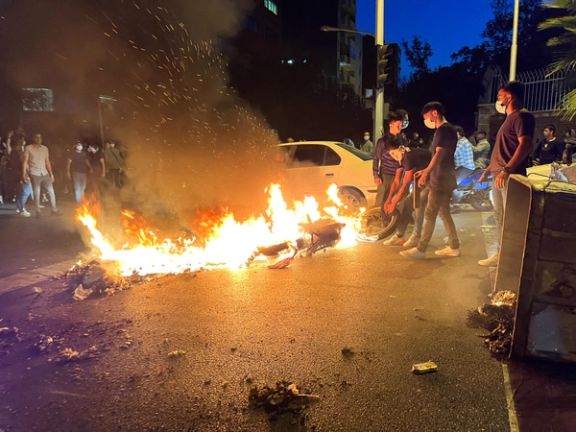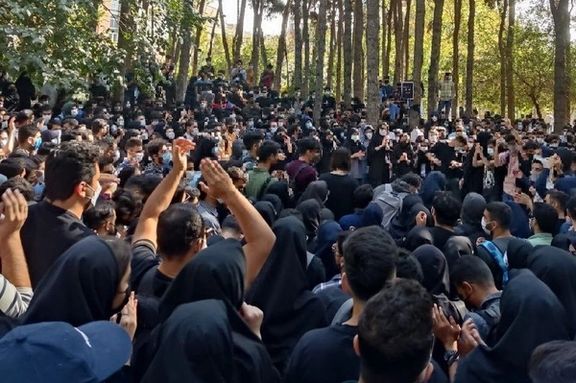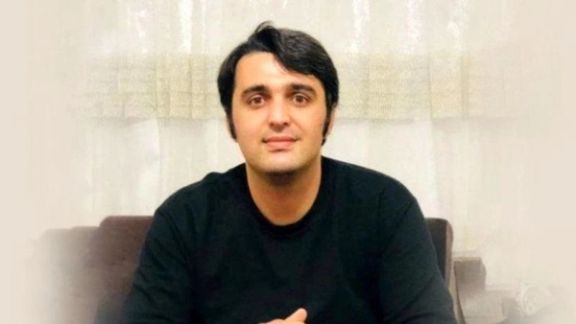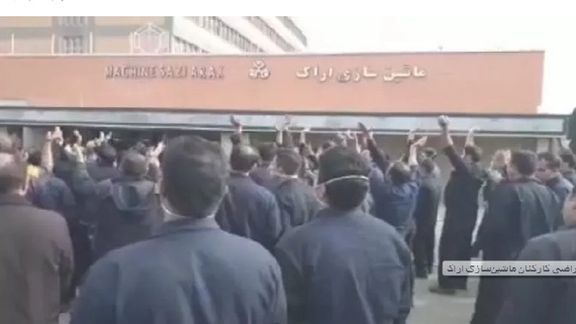Hacktivist Group Breaches Into Iranian Financial Service App

An Iranian hacktivist group says it has successfully infiltrated the financial service application, Hafhashtad, sending out messages calling for an uprising against the regime.

An Iranian hacktivist group says it has successfully infiltrated the financial service application, Hafhashtad, sending out messages calling for an uprising against the regime.
On August 31, numerous users on the X social network, formerly recognized as Twitter, reported receiving text messages that included the phrase "Death to Khamenei" and invitations to public gatherings. These messages featured the Telegram address of the Black Reward group along with the hashtag #MahsaAmini.
Amini’s death in September last year in police custody, sparked a wave of protests across the country and as the anniversary approaches, many are expecting a renewed uprising.
After the hack, Black Reward posted on their Telegram channel saying, "As we all know, the flames of revolution may subside but will never be extinguished."
Hafhashtad, an Iranian financial service provider specializing in USSD code-based transactions and a mobile application, acknowledged a "disruption" in their messaging system but refrained from confirming any security breach.
Over recent years, Hafhashtad has conducted extensive advertising campaigns on Iranian government television channels and has provided financial support to various sports programs affiliated with the Islamic Republic of Iran Broadcasting (IRIB).
The hacktivist group Black Reward gained reputation last year when they published a trove of documents related to Iran's nuclear program. Additionally, the group announced a successful intrusion into the email accounts of managers and staff members of Press TV, the government's international English news channel.

Amid intensified pressures on the anniversary of the Iranian protests, 12 political activists have warned the government to avoid igniting the people's anger.
In a statement issued on August 30, the dissidents condemned the government's scaremongering ahead of the anniversary and called for sympathy with young protesters.
During recent arrests, including the detention of popular singer Mehdi Yarahi, the government posted pictures of his harsh treatment with the obvious intention of scaring others who might support the protests. Social media activists called on others to avoid reposting the pictures and frightening potential protesters and their supporters.
Also reports on Wednesday said that security forces used violence while they arrested Iranian journalist Nazila Maroufian for the 4th time this year.

The joint statement, signed by activists including Mehdi Nasiri (the former editor of Kayhan newspaper who is now a staunch critic of Supreme Leader Ali Khamenei), former student leader and political prisoner Abdollah Momeni, dissident cleric Shahabeddin Haeri Shirazi, and reformist figure Abdollah Naseri, among others, emphasizes that any security, military, or judicial measures taken against protesters on the anniversary of the Women, Life, Freedom movement will only further fuel the accumulated anger of Iranians.
The statement additionally asserts that protesting "erroneous policies that have brought the country to the brink of collapse" and expressing dissent toward "the government's detrimental actions" are integral aspects of Iranians' rights as citizens. The statement also emphasizes the importance of holding the government responsible for its "harmful policies," and suggests that the government should not avoid its duty towards the nation.
The signatories strongly denounced the harassment faced by the families of individuals who were either killed or injured during the protests. They emphasized that subjecting these families to such treatment would equate to a violation of the citizenship rights of the Iranian people. Moreover, the signatories also criticized the parliament for passing new legislation concerning hijab, deeming it illogical and a means to infringe upon the rights of the people.
Quoting several political analysts on the subject, Iranian Lawyer Pegah Bani-Hashemi told Iran International television that "Even those who do not believe in regime change predict that the government might start a period of unprecedented bloodshed in Iran."
Meanwhile, Iranian journalist Reza Haji Hosseini, in a conversation with Iran International TV, found it peculiar that the activists who aimed to show solidarity with the Women, Life, Freedom movement through this statement did not include any women among their ranks. Nevertheless, he acknowledged the courage exhibited by the signatories. They boldly cautioned the government against potential severe actions on the movement's anniversary, especially as the government appears resolute in quashing any form of protest.
In another interview with the Iran International TV, political activist Damoun Mohammadi said: "Not only scaring the people and political and human rights activists will not have any positive result for the regime, but it is more likely to flare up further protests."
Iran International journalist Siamak Ghaderi highlighted that the statement serves as evidence that despite the government’s efforts to suppress activists and protesters, the movement remains vibrant and active within the fabric of Iranian society.
The statement from Iranian activists warns that any attempt to suppress protests on the anniversary could pose a significant threat to Iran. It emphasizes that the government and its decision-makers will be held accountable for all repercussions stemming from any acts of violence.

Since the start of anti-regime protests in September 2022, the Iranian government has dismissed at least 52 dissident university professors.
Etemad, a notable reformist daily in Iran, released an article on Thursday outlining 52 professors who have been dismissed, forced into retirement, or barred from teaching. The article described this as the "second wave of professor removal in the name of purification" within the past year.
Earlier in August, the same daily published a list of 157 tenured professors who were terminated due to their criticism and dissenting viewpoints from 2006 to the end of August 2023. This extensive purge includes not only tenured faculty but also non-tenured lecturers who are being replaced by professors of a more "religious" and "revolutionary" nature.
Of the 157 previously announced names, 58 were removed during Ebrahim Raisi's administration. The recent article adds 52 more names, illustrating the continuing effort by hardliners to eliminate dissenting voices from academia.
The daily clarified, "It is important to note that these names do not constitute an exhaustive list of all the professors removed over these 17 years. Rather, they are the names that Etemad has been able to confirm."

Despite the academic year starting in less than a month, Etemad reports that the "distressing changes" within the educational system across 150 universities are ongoing.
The phenomenon of "political purification," as referred to in Iranian media, extends beyond universities. Regime hardliners are also removing their rivals from various other organizations and institutions. The term "purification" was coined by former Parliament Speaker Ali Larijani to describe the ultraconservative allies of President Raisi, aiming to consolidate government power by sidelining other politicians and officials.
This trend within academia began during Mahmoud Ahmadinejad's presidency and persisted through Hassan Rouhani's administration and President Ebrahim Raisi's term. Over these years, successive governments systematically expelled experienced professors for their "secular views" and other political reasons.
The second wave of purges, which emerged shortly after the protests of the Woman, Life, Freedom movement last September, has recently escalated with the support of senior officials.
While some officials attempted to portray the mass dismissals as unrelated to their support for nationwide protests sparked by the death of Mahsa Amini in police custody, many hardliner politicians openly endorse these actions and even call for harsher measures against the professors.

Notably, Hossein Shariatmadari, the hardline editor-in-chief of the Kayhan newspaper linked to Supreme Leader Ali Khamenei's office, endorsed the decision to terminate professors who had expressed solidarity with the protests. Shariatmadari deemed their dismissal as the "minimum punishment." He also welcomed the recruitment of ideologues for teaching roles, referring to Sharif University's invitation of three hardliner figures, including Amir-Hossein Sabeti, a television presenter, to teach Islamic subjects.
This university purges have elicited criticism from Iranians and disapproval from some regime insiders, like Iran's former nuclear chief Ali-Akbar Salehi, who also serves as the deputy head of the Academy of Sciences of the Islamic Republic of Iran. Salehi stated recently that the influx of unqualified academics replacing expelled professors would degrade the academic standard of universities, degrading their status.
According to some reports, President Raisi plans to introduce 15,000 "revolutionary" professors to academic faculties nationwide.
Top government officials, along with most university presidents and higher education officials, have refrained from acknowledging the political motivations behind the dismissals.
Hassan Khomeini, the grandson of Islamic Republic founder Ruhollah Khomeini, condemned the ongoing wave of dismissals as a "disturbing issue," warning of severe consequences if the independence of universities and students is compromised.
This policy, which seems to be part of a broader initiative to eliminate regime critics from universities and suppress student protests, has also resulted in announced delays in the start of the academic term in certain universities. Additionally, some universities might resort to online lectures to reduce the likelihood of campus protests on the first anniversary of the Women, Life, Freedom movement.

A young Iranian protester who was one of the icons of the Women, Life, Freedom movement has died in prison following a "seizure," Iranian judiciary claimed .
Javad Rouhi, who was 35 years old, was incarcerated in northern Nowshahr prison and had been sentenced to death. The Supreme Court overturned his death sentence and he was awaiting re-sentencing. Amnesty International had previously reported extensive accounts of severe physical and psychological abuse during Rouhi's detention.
Majid Kaveh announced the news of his death on social media (X, formerly known as Twitter). Rouhi's family also confirmed that he had died but there remain differing accounts regarding the circumstances of his death. Official reports say that he had a seizure at 3:45am on Thursday and was urgently transferred to Shahid Beheshti Hospital in Nowshahr where he was pronounced dead. Other activist reports suggest that he was killed by the regime.
Tasnim News Agency, affiliated with the IRGC, reported that a judicial order had been issued to inspect the prison's CCTV cameras, document the deceased's personal belongings including notes and medications, and conduct a post-mortem examination and toxicology tests to ascertain the cause of death.
Rouhi was arrested during the Woman, Life, Freedom protests in September 2022 and was received a triple death sentence, which was overturned by the Supreme Court.
Rouhi is the latest name added to the long list of political and ideological prisoners who have lost their lives in Iranian prisons in recent years.
Amnesty International reported in September 2021 that it had documented at least 72 individuals who had died in Iranian prisons due to various forms of torture and mistreatment since January 2010.

Protesting workers at Iran's Arak Machinery Manufacturing who are refusing to work over wage disputes reached new levels of intensity on Thursday.
According to the Telegram channel Bazaar Civil Protest, the worker's protest at the factory, also known as Machine Sazi Arak, gained momentum as the strikers insist that they will not stop until they receive their rightful wages.
Over the past few months, the facility's workforce has staged several strikes over low wages - typically less than $200 per month - and other labor-related concerns. On April 21st, they synchronized their strike action with workers from at least 16 oil and industrial units as a collective and symbolic protest.
Within the past year, Iran has witnessed over 1,600 labor rallies and strikes. However, the Islamic Republic's security and judicial authorities have responded by summoning, arresting, and incarcerating numerous labor activists, aiming to quell dissent.
Authorities contend that the orchestrated strikes are instigated by anti-regime groups, an often-used excuse that only undermines the legitimacy of workers' demands without addressing them. Persistent strikes add to escalating tensions and Iran’s ailing economy but with no action taken regarding workers’ demands, there seems to be no imminent resolution in sight.

Actress Hanieh Tavassoli says that religious authority and the power of clericalism is losing its grip in Iran, commenting on Kamal Tabrizi's 2004 film Marmoulak (The Lizard).
Tavassoli hailed Tabrizi's film as one of Iran's most significant comedic works saying, "Your words are so true today, Mr. Tabrizi. It's evident that the perspective on clericalism has shifted. It's a different era."
These comments come after Tabrizi’s recent interview about the evolving outlook of today's generation towards the dominant clerical authority in Iran. "Today's generation has a different perspective on the clerical class that is not in line with the world of Marmoulak and its satire,” he said.
Marmoulak, released in 2004, offers a portrayal of humorous situations, including a character adopting clerical attire for thieving purposes. However, despite its sarcastic undertones, the film ultimately defends the clergy and their societal role.
Tavassoli further expressed her thoughts on her Instagram story, stating, "Our cinema is far behind today's intelligent, rebellious, and courageous youth and society. Cinema should freely follow this generation's footsteps to catch up with them in a few years. Everything comes down to these three shining words: Woman, Life, Freedom."
The ongoing nationwide Woman, Life, Freedom protests have seen demonstrators expressing their sentiments against the clergy and defiantly removing the hijab as a form of protest.
Since the 1979 revolution, the clergy have gained increasing power in Iran. However, discontent has surged in recent years, particularly amid waves of protests concerning economic, political, and civil rights issues.






